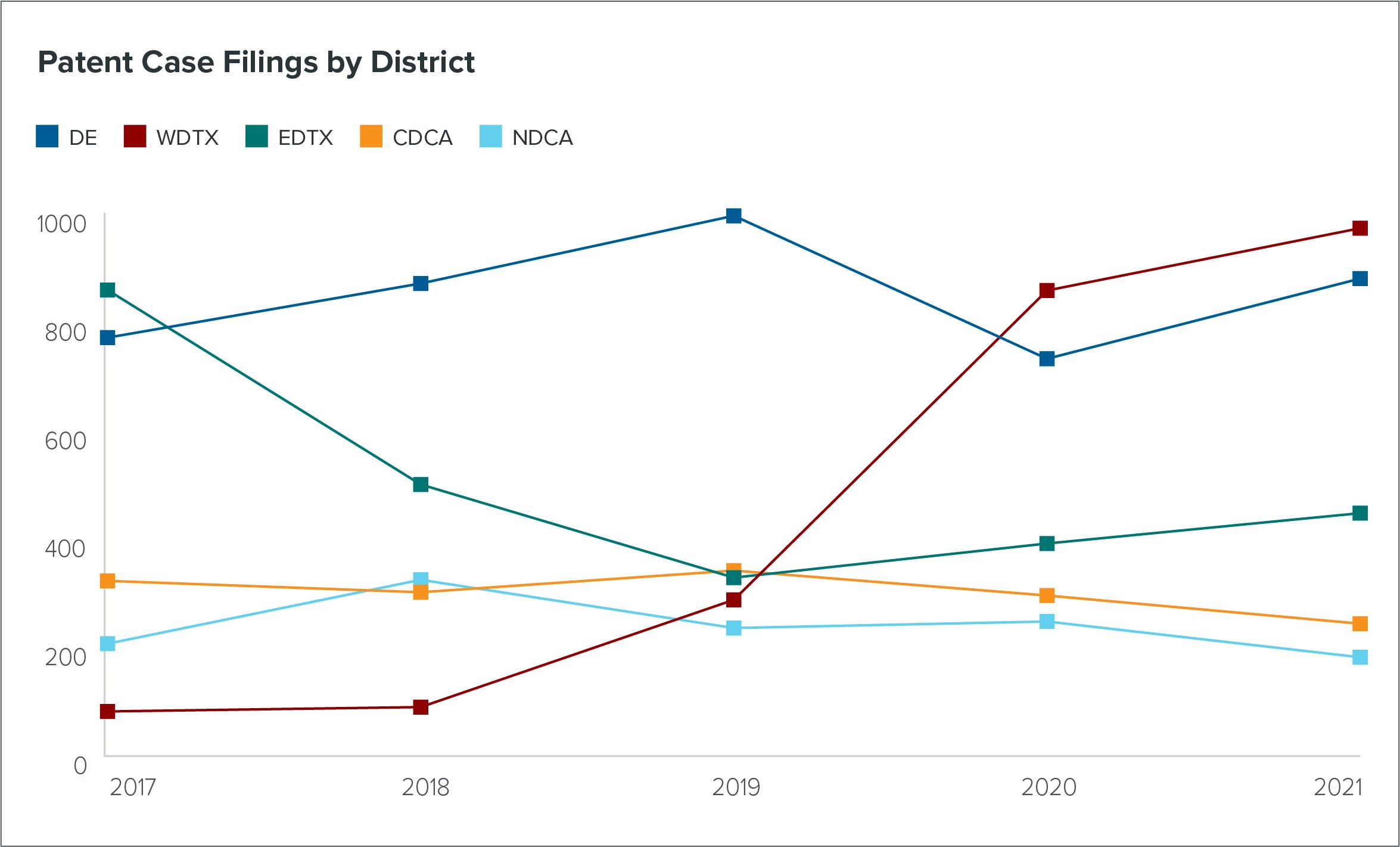On July 25, 2022, the chief judge of the U.S. District Court for the Western District of Texas issued an order specifying that all future patent cases filed in the Waco Division will be randomly assigned to one of the 12 district judges within the Western District. This order upends the current practice under which plaintiffs filing in the Western District could file in the Waco Division to ensure their case would be handled by Judge Alan Albright, the only district judge in that division. The chief judge’s order will almost certainly have an impact on the number of patent cases filed in the Waco Division moving forward.
Judge Albright was nominated by President Trump in January 2018 and sworn in on September 18 that year. According to Docket Navigator, 2,522 patent cases have been filed in Waco and assigned to Judge Albright in his less than four years on the bench. In contrast, Judge Albright’s predecessor, Judge Walter Smith, handled a total of 44 patent cases in the 16 years between April 2000 and his retirement in 2016. And in 2018, only 93 patent cases were filed within the entire Western District of Texas.
As reported in LexMachina, patent case filings in the Western District have increased dramatically since Judge Albright took the bench, from fewer than 100 per year to almost 1,000 in 2021. In 2018, only 3% of all patent cases nationwide were filed in the Western District of Texas. That number grew to 24% in 2021, with Judge Albright himself handling 23% of all patent cases filed nationwide and 95% of all patent cases filed in the Western District of Texas that year. Indeed, as the Western District of Texas’s share of patent cases has increased, filings in other patent-heavy districts have decreased, including in the District of Delaware, the Eastern District of Texas, and the Central and Northern Districts of California.

This influx of patent cases into Waco is attributable both to Judge Albright’s practices and procedures and his expressed desire to handle patent cases because of his background handling patent cases as a private practitioner. Immediately after taking the bench, Judge Albright issued an order governing patent proceedings, which set early deadlines for preliminary infringement and invalidity contentions, as well as Markman proceedings. He also significantly streamlined discovery by implementing specific procedures to raise discovery disputes.
Many plaintiffs were also drawn to Waco since Judge Albright’s appointment, because the Waco Division’s average time to trial in patent cases is approximately 24 months. As a result of the district’s quick time to trial, litigants rarely file motions to stay pending IPR proceedings in Waco. According to Docket Navigator statistics, only 12 such motions have been filed in Waco since 2019 and 67% of them have been denied. Under its prior Fintiv guidance, the PTAB routinely denied IPR petitions where underlying district court proceedings were pending in Waco, but the PTAB’s approach to this issue may change given the USPTO Director’s recent June 21 Interim Procedures for discretionary denials in post-grant proceedings.
This week’s order is likely to have ramifications for other districts as well. Patent litigators should be aware that filing a case in the Waco Division of the Western District no longer guarantees that Judge Albright will be assigned to the case – it could be assigned to any of the twelve judges of the Western District. Since other judges in the district have less experience with patent cases, have differing views on issues related to transfer and early dispositive motions, and most do not have standing orders governing patent proceedings, patent plaintiffs will not be guaranteed the certainty of early infringement/invalidity contentions and Markman proceedings, as well as the swift time to trial plaintiffs have received under Judge Albright. Finally, it is also unclear from the order whether cases filed in the Waco Division but assigned to a different judge would ultimately proceed on the Waco docket or moved to a different division. It is also unclear whether such cases will be tried in Waco or in the judge’s home division. This warrants serious consideration as the Waco jury pool may well be different from the pool in Austin, for example.
Contacts
- /en/people/w/woo-darryl

Darryl M. Woo
Partner - /en/people/l/larochelle-christie

Christie Larochelle
Partner
